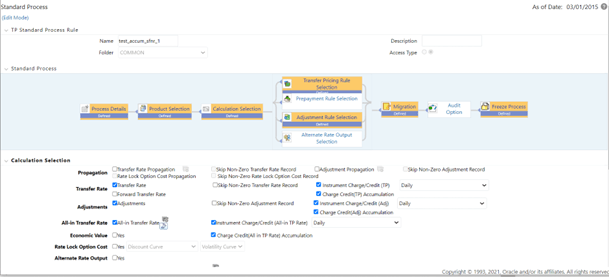30.2 Propagating Transfer Pricing Results
Depending on your requirements, you can choose to propagate Transfer Rates, Adjustment Rates, or Option Costs, by selecting the appropriate Propagation Processing Option in the Transfer Pricing Process.
The propagate Transfer Pricing results, follow these steps:
- Create or update a Transfer Pricing Rule.
- Navigate to the Transfer Pricing Process Calculation Selection block.
Figure 30-3 Transfer Pricing Rule - Calculation Selection

- Select the propagation parameters:
- From a Standard Transfer Pricing Process, select Transfer Rate and select
the Transfer Rate Propagation option and/or Adjustment Propagation option.
Selecting Transfer Rate Propagation updates all term-related instrument
records, which have an instrument-level history for a prior period with the
Transfer Rate that applied in that prior period. If Adjustment Propagation
is selected, then all Adjustment outputs (except breakage charges) including
rates and amounts will be propagated.
Note:
If you have pre-populated some Transfer Rates or Add-on Rates before running propagation and you would like the propagation process to skip these records, then select the Skip Non-Zero Transfer Rate Record option and or Skip Non-Zero Adjustment Record option. - From a Stochastic Transfer Pricing Process, select Option Costs and select
the Option Cost Propagation option and/or Adjustment Propagation option.
Selecting Option Cost Propagation updates all term-related instrument
records, which have an instrument-level history for a prior period with the
Option Cost Data that applied in that Prior Period. If Adjustment
Propagation is selected, then all of the Adjustment Outputs (except breakage
charges) including rates and amounts will be propagated.
Note:
If you have pre-populated some option costs and you would like to propagation process to skip these records, then select the Skip Non-Zero Option Cost Record option.For more information, see the Transfer Pricing Process.Note:
When a table is updated using a propagation pattern, an instrument record must satisfy the following criteria to receive a Transfer Rate, Adjustment Rate, or Option Cost.- It must be an instrument that exists in both the Target (processing) Table (with the current As-of-Date) and the Source Table (with the prior period based on a matching ID_NUMBER).
- The instrument must also satisfy one of the following
conditions:
- It must be a fixed-rate (Repricing Freq = 0 in Target table) instrument.
- It must be an adjustable-rate (Repricing Freq <>
0 in Target table) instrument with Target Last
Repricing Date <= Prior Period As-of-Date. In
other words, it must be an Adjustable-Rate
Instrument that has not been Repriced since the
prior period.
The matched spread is also migrated from the prior period record and not recomputed from the Transfer Rate and Current Rate on the Target Table Record.
- For Adjustment Rate Propagation, all rates are propagated regardless of fixed or adjustable type. If additional logic is required to control the Propagation of Adjustment Rates, data filters should be used to specify the conditions.
- From a Standard Transfer Pricing Process, select Transfer Rate and select
the Transfer Rate Propagation option and/or Adjustment Propagation option.
Selecting Transfer Rate Propagation updates all term-related instrument
records, which have an instrument-level history for a prior period with the
Transfer Rate that applied in that prior period. If Adjustment Propagation
is selected, then all Adjustment outputs (except breakage charges) including
rates and amounts will be propagated.